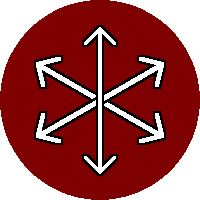By the way, you can hover over words that have superscript numbers and it'll show you a footnote!
If you're reading this, you're probably wondering why Clock has been changed to Arrow. The purpose of this page is to explain it, so let's dive in!
For a while, Clock has been an unintentional outlier among the Fundamental Concepts. Not only does its associated color not flow entirely well with the rainbow created by the Concepts’ colors, but the actual ideas it covers are already covered by other Fundamental Concepts (and covered better, even). Thus, figuring out a way to improve on Clock’s design without having to completely uproot much lore has been a top priority over the last month. Today, we present our results. First, let’s define exactly what problems we’re trying to solve.
A lesser problem of Clock, but one that makes it noticeably stand out, is the fact that its associated color is dark crimson. It doesn’t exactly fit smoothly between bright red and bright orange. Changing the color to be between Realm’s red and Sense’s orange presents the problem of it being hard to distinguish, and trying to shift Clock’s position on the hierarchy disrupts other Concepts’ interactions with each other (i.e. Faith and Force’s opposition, Limit and Truth’s central nature, etc.). That said, changing the color at all would also majorly impact the theming of the Beast, the Concept’s associated Demiurge. With this in mind, it seems the best place for the Concept would be just behind Realm, though that would disrupt Realm’s position of being first. Thus, the question becomes: how do we make Clock be before Realm while keeping Realm as first?
Of course, the main problem of Clock’s lack of fitting in is not its color, but rather its concept. The central issue is that the ideas that Clock encompasses are fairly loosely connected—while there are other Concepts with a wide range of things that they deal with, their core concepts are certainly strong enough that their title of Fundamental Concept is a well-earned one, and as a result, they feel unique in the things that they cover. Clock, notably, does not live up to this expectation. Cycle, despite coming after Clock, covers essentially all the core ideas that Clock does, and covers them better. Its nature of cyclicality and repetitive infinities ties it to the nature of the Fundamental Concepts as a whole but also intrinsically ties it to not only patterns and numbers, but also time, the very thing that Clock is meant to deal with. Therefore, if Cycle’s central focus can encompass Clock’s and do so in a more strongly connected way, then the question becomes: what niche is there left for Clock to fill?
Consider the end of the line. Force, a Fundamental Concept necessary in applying all prior Concepts and bringing them into reality and out of the conceptual state—the Fundamental Concepts can’t exactly govern anything real if there’s nothing to make them into physical, material things. Thus, the material world requires all of the Fundamental Concepts, but Force is a definite prerequisite for the material aspect. With that said, upon further inspection, Force itself has a prerequisite. Applying force is impossible without a prior direction.
In fact, many of the Fundamental Concepts have similar requirements. Moving back a step, Cycle needs a direction, even if it’s merely one that points back in on itself. Unity brings together, thus it needs to be able to direct two or more things toward a common point. Limit’s entire focus is based around stopping things; if things aren’t going anywhere and/or if there is no direction to push them back in, then they cannot be stopped. In fact, if we go back to the very beginning, Realm possesses a directional requirement too. Realm brings things from zero dimensions to one dimension and higher, but a dimension is merely a new direction to point. How can such a world without direction exist?
Thus, we are brought to:

Arrow, the reworked Second Fundamental Concept, functions as the prerequisite direction.¹
¹ Thank you to Isadore for suggesting it and helping through much of the design process!
Not only does it fulfill a gap that the Fundamental Concepts left, but it also works immensely well for the existing lore of Clock—Clock was associated with time, violence, and weapons, not all particularly connected. Arrow still associates with these things, but in a broader way that strengthens the connection far more than Clock did—Arrow becomes time’s arrow, the hands on a clock, the ammunition and weaponry of arrows, and the one who directs, rather than acts,²² Which fits remarkably well with the Beast’s existing lore, given that it spends almost all of its life sealed within a Vault but still overseeing and guiding things from within its willing imprisonment.
all in one.You, the reader, may now have a question—if Arrow is prerequisite to Realm, then does that not dismiss the Realm Goddess’s notion of being first?
Consider:
A World without a Direction to point to and from is unbegun and pending; a Direction without a world to inhabit and shoot through is formless nameless.
Thus: Arrow exists before Realm; the Realm Goddess exists before the Beast.
With this, the Realm Goddess’s prideful claim remains accurate, though were she to claim that her associated Fundamental Concept takes precedence (and she does claim so, to the point where the Courtyard server’s icon will remain in the same order),³
³ Several other places, such as dawnbreak, the creation myth of the Courtyard, will also maintain the previous hierarchy’s order, given that such in-universe texts are subject to bias and influence from the Realm Goddess manipulating the story, a manipulation that the Beast’s passiveness leads it to not correct.
it would be somewhat of a falsehood, considering that Arrow would be first in the hierarchy.